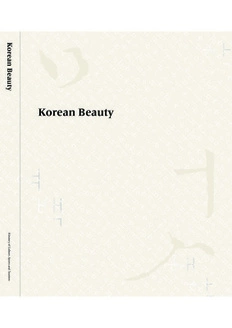
Korean Beauty PDF
Preview Korean Beauty
K o r e a n B e a u t y Korean Beauty M in istry o f C u ltu re , S p o rts a n d T o u rism Korean Beauty Contents Korean Beauty 4 Yeobaek 9 Chagyeong 49 Meot 89 Gyeopchim 129 Haehak 161 Yunghap 193 Korea Contemporary 234 Appendix 241 Korean Beauty Lee O-Young Around the turn of the twentieth century, Westerners flocked to Korea on hearing rumors that there was gold in the ground. Although many failed to find it and went home, they did not regret the experience, because they knew, in the words of one missionary, that “the gold lay not in the ground of Korea, but in the hearts of the Korean people.” In the secret of the gold that lies hidden in the heart, one of the cryptic symbols on the treasure map is meot. And this book has been made to help decode that symbol. The word meot may sound strange if you are not Korean, but once you learn its meaning, you will be able, like those Westerners of a century ago, to dig out the precious gold that lies deep in the hearts of the Korean people. Actually, even native-born Koreans can rarely give a clear answer if you ask them what meot is. They know that meot is 4 similar to mat (taste), and they know what has no mat and what has no meot. But all you can do is to taste the meot for yourself in the uniquely Korean objects, customs, and behaviors that appear in this book. The beauty of Chinese ceramics lies in their substantial size and mass, while Japanese ceramics are distinguished by colors as brilliant as a red stingray. But with Korean celadon vases or Joseon Dynasty porcelain “moon jars,” the beauty lies in the gentle curves. Is it the beauty of the curve, then, that defines Korean meot? And even then, what is the beauty of the curve? When driven by function or efficiency, human beings make a straight line. That’s why most man-made objects are formed of straight lines, in contrast to the curved lines of nature. Whether you see it with your eyes or feel it with your heart, a straight thing is not natural. In straight things there is no change or movement. Like direct sunlight, a bald straight line has no shade. In a word, Koreans would say that anything functional, efficient, unnatural, and bald has no meot. A footpath has meot, but an expressway has no meot. In today’s parlance, meot is analog rather than digital. It has something ambiguous and irregular about it. It cannot be 5 quantified in numbers or weighed in a scale. That’s why one Japanese ceramics expert who loved Korean pottery said that the beauty of Korean ceramics lay in “the presence of regularity within irregularity and the flow of perfection within imperfection,” for “regularity without irregularity is merely mechanical, while irregularity without regularity is nothing but chaos.” Thus, meot is born when regularity and irregularity are in harmonious balance. The Japanese expert admitted that Japanese ceramics “sometimes lose vitality through the habit of seeking only perfection.” Here we can find another definition of meot. Japanese ceramics have no meot. The reason why Korean ceramics have meot is that they don’t lose their vitality. Nowadays, the business people and tourists who come to Korea are interested in the “Miracle on the Han River” that produced the country’s successful industrialization. But if they spend a lot of time with Koreans and encounter traditional Korean culture, they may find, like their forefathers a century ago, that the real gold of Korea lies not in the ground but in the hearts of the people. A tourist map is not enough. Let someone arriving in Korea for the first time, or someone who has lived here for years, or indeed someone who was born Korean, hold this book in 6 their hands; for when they do, I believe they may find that mysterious and fantastic Treasure Island, the land of meot. 7 88 Yeobaek Lee Joon
